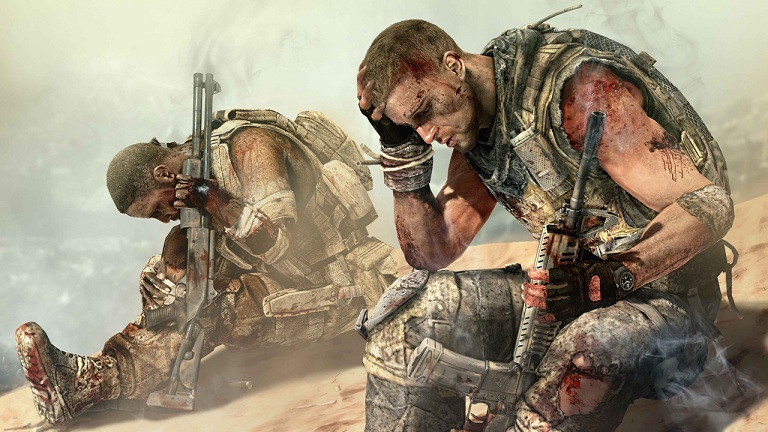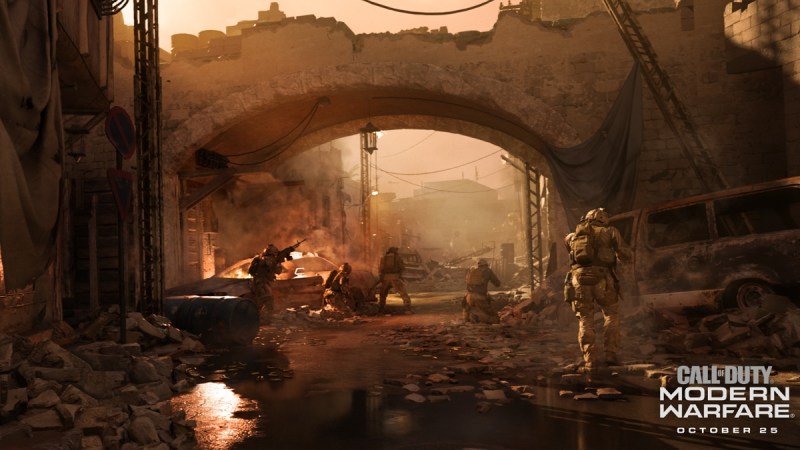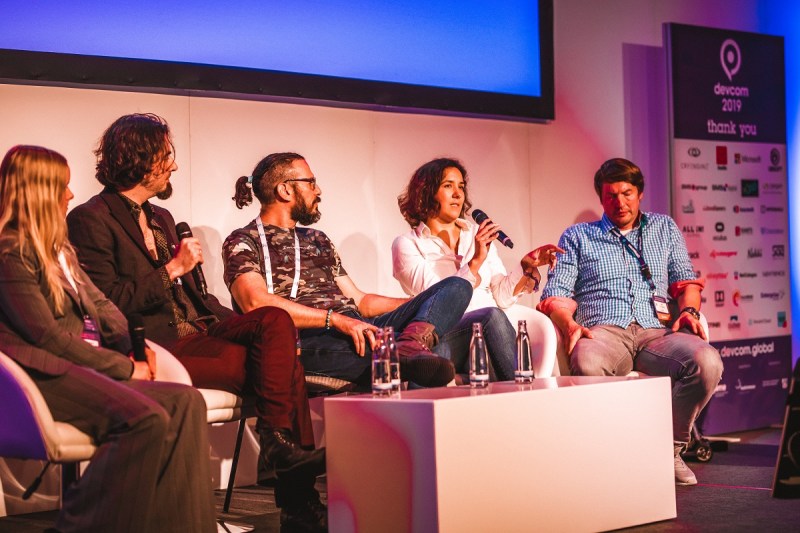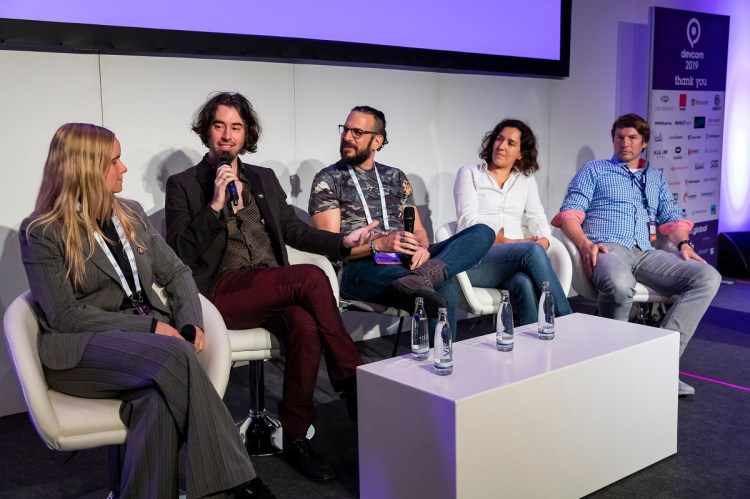
Above: Spec Ops: The Line
Once upon a time, every evil was Russian. Now every evil wears a headscarf and speaks Arabic. What does that do to the general casual narrative we’re making? It’s not about the process of me going out, pulling out a virtual gun, and mowing my way through some adversary. It’s the imagery of who is confronting me, and how these people or these creatures are depicted.
We had an interesting discussion earlier about the representation of monsters in games. I have much less of a problem fighting monsters in a game than I have fighting other humans. When there are other human beings there, we have to think about how we present them, how we present acts of violence against them and their acts of violence against us. What kind of narrative does that create that reaches beyond the game?
Portnow: I have a very specific example to reinforce your point. When the first Modern Warfare came out, I was speaking with the Xbox community team. Before that game came out, the slur “sand n-word” never came up on Xbox Live. It wasn’t part of their list of banned words and phrases. After Call of Duty came out, where most of the enemies are Arabic-speaking, it became the second-biggest slur caught on Xbox Live. Clearly we do have an impact in who we dehumanize and who we present as the enemy.
Bøhler: Does this mean that we can’t make any games that are about fighting a specific war? I guess that’s a challenging question. If it’s problematic that we portray certain people in a certain way, if someone wants to make a game about a specific battle, how do we deal with that?
June 5th: The AI Audit in NYC
Join us next week in NYC to engage with top executive leaders, delving into strategies for auditing AI models to ensure fairness, optimal performance, and ethical compliance across diverse organizations. Secure your attendance for this exclusive invite-only event.
Portnow: I think that’s the hyperbolic case. I think that takes it to a sort of strawman extreme. Clearly if you present these things in a way that shows both sides — if you’re representing a war from one side, you’re already usually doing it injustice. On the other hand, if you’re never commenting about the impact you have on people — at least on the civilian population of the other side — again, you’re doing it injustice. I don’t think it’s a question of whether we can never make a game about the Iraq war, never make a game about World War II. To me it’s a question of how we present it in a way such that we’re not just using people from a certain culture as generic enemies, and using that war as window dressing.
Liberman: To add to your point, I think we need to stop promoting and supporting as game developers the stigmatization of our enemies. Our enemies are people just like us. There is no actual good and evil, black and white. Our lives are gray. We have people that we fight or cooperate with, but that always serves some type of propaganda. We even see this in the colors in games — red versus blue, things like that. If I can’t see the game from the point of view of the enemy — let me play the other side, and not in a shallow way. I want to play a narrative with the same depth as when you let me play the one side. I think we need to improve that.

Above: Call of Duty: Modern Warfare
GamesBeat: I remember that America’s Army had two interesting aspects to it. One, you could not play as the opposing side, the “terrorists.” Whatever you were playing, you were on the American side. If you accidentally killed someone with friendly fire in the game, you wound up in prison, the consequence of the wrong kind of violence. They made some interesting choices as far as how they chose to depict violence, although maybe not surprising, given who they were.
The other aspect or challenge or problem here is capitalism and commercial enterprise. Games are driven by supply and demand, like any product. You make games that people want to play. If you stack up all the sales of games for peace on one hand and all the sales of games for violence in the other one, you see what people play.
Portnow: Would you include FarmVille and the Sims and Bejeweled in that games for peace section, though? Because if so, the best-selling games are actually games for peace.
GamesBeat: They could all get hit with that attack phrase, “boring.”
There was a period about four or five years back where I was told, in boardroom after boardroom, that women don’t play games. We have a self-reinforcing cycle. We say violent games sell. Well, violent games sell because we’ve made violent games and pitched them to our audience as what games are. But we’re unsustainable at this point. We’re spending $100 million building games for a narrower and narrower portion of the population. If we want to actually sustain the game industry, we can’t only work on that basis. There’s so much more of the human experience to explore.
Imagine if films were only Marvel. Imagine if books were only romance novels. Nobody else does that. I would argue that from a capitalist perspective, we actually do want to reach the enormous audience that we’re not currently reaching by just building violent games.

Above: Antonia Koop of Kite Rider Strategic Adventures speaks at Devcom panel on violent games.
Koop: Let me play devil’s advocate, speaking for the business side. I’m technically the wrong person to do this, because our audience isn’t the general gaming population. We’re specialists in B-to-B. But still, it’s an argument I can pick up because I heard it with regard to media reporting, over and over. I tell journalists that you have to look at conflicts in a differentiated way. You have to talk about what’s really happening. Don’t just go for gory scenes, for pictures of the bombing that look the same as the other 250 bombings that you’ve covered before. But then they say, “Well, this is what our audiences want.”
I had that conversation over and over. Looking at media organizations, we have so many of them out there, and they’re all reporting the same shit. It’s just the same. They’re all in a cutthroat competition with each other, but they’re competing only over who gets the same story first. That’s a business opportunity.
Now we’re coming into a zone where games look so good that more and more we can’t just compete on visual quality. So what are we competing on? We’re competing on story. We’re competing on experience. The differentiated view — driving into what’s happening, driving into the motivations of the player — is a business opportunity. It’s differentiation. There’s real business benefit in looking at this.
Ullman: To your point about capitalism, it’s not just the market that’s driving this. Even we as creative people, we’re lazy sometimes. We follow the beaten path. It pays off to be disruptive, to explore, to go about things in a new way. Our industry, over the last decade, has evolved quite a bit. Right now we’re much more diverse. We’re going to see that we also have counter-examples. Not everyone is following the crowd, especially if there’s a lot of financial risk going along with that urge to make the same thing.
I think what we’re going to see — people are going to succeed when they come up with their own stories, their own approaches. We as game developers have a huge toolbox of things we can use to come up with the right experience, the right content that we feel expresses the ideas we have in our minds. We’re going to see that more and more. Following the pattern of how everything needs to be an action shooter, a racing game, a sports game, that doesn’t cut it anymore.
I think we’re also going to see the heavy hitters try to reinvent themselves. It’s an open question as to how successful they’ll be, but there’s a lot of room for disruption, a lot of space for innovation.
Bøhler: Isn’t it a kind of misconception, though, that most games are violent? There are so many games that aren’t violent. You can also ask, is something like Kingdom Hearts violent? It kind of is, but not really?
Portnow: I guess it’s a question of whether something is combat-centric. But on the other hand, well, there are different types of violence, like you said. Do we have to start talking about what kinds of violence are the most impactful, and in what ways?

